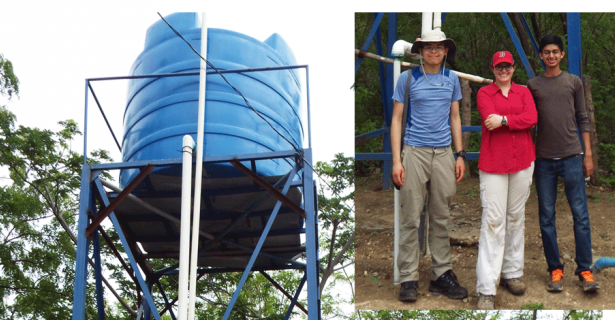The humid air of the bridge between plane and airport confirmed that I wasn’t imagining things. Reality became more vivid with each leg of the journey – a car ride through a Managua evening, then the next day along a cobblestone highway to the village of Silvio Mayorga in Nicaragua, the site of the new Tufts Engineers without Borders project.
Until recently, my work with Engineers without Borders has taken place in a classroom. This week, however, our work has begun in earnest with a trip to our project site for a community assessment. Our general focus since choosing Silvio Mayorga as our partner community has been clean water access. Upon arriving, we found that the situation was better than we had expected.
The community is spread along the highway, with the church as a center point. Next to the church is a large communal well, the deepest of many in the town. After a period during which the well was capped and unusable, members of the community organized to install a pump, tank, and rudimentary distribution system. As a result, many now have access to clean water, without the high calcium levels that has been causing discomfort and health problems for many years. This system, however, is not without significant drawbacks. The structure that supports the tank is unstable, preventing it from being filled fully by the pump without the tower collapsing. The tower’s height is also insufficient to propel water throughout the distribution system. That system does not reach every house, mainly due to lack of resources on the part of individual families.
To understand all of this better, I’ve been working with the rest of the travel team to interview each household in the community. This is one of the key components of our trip, allowing us to collect qualitative information for our project design. I’m a biochemistry major with a love of Spanish – but by no means fluent. This trip has been my first real chance to practice speaking the language. It’s been a stressful first time, since the success of our surveys relies on understanding between American interviewer and Nicaraguan interviewee. Initially, it seemed impossible. The first few interviews were rocky, with many questions and answers misunderstood. What it took to make it work was teamwork and patience. Three out of four members of our team speak Spanish, but none of us speaks fluently. We have relied on each other to fill in the blanks. When my knowledge falters, one of my teammates is prepared to pick up the thread of the conversation. By the end of the surveys, thanks also to patience from each community member interviewed, I was more able to communicate freely.
My understanding of this project and what it represents had grown tenfold so far this week. Through these surveys, I was able to meet many of the families that this project will help. We are serving a community with our work, but it’s easy to forget that when we work on it from afar. This community is made up of real people, with individual lives and concerns. This trip, so far, has transformed my understanding of the project from details about water quality and designs for pumps and tanks to an endeavor that has the ability to change lives and livelihoods.

